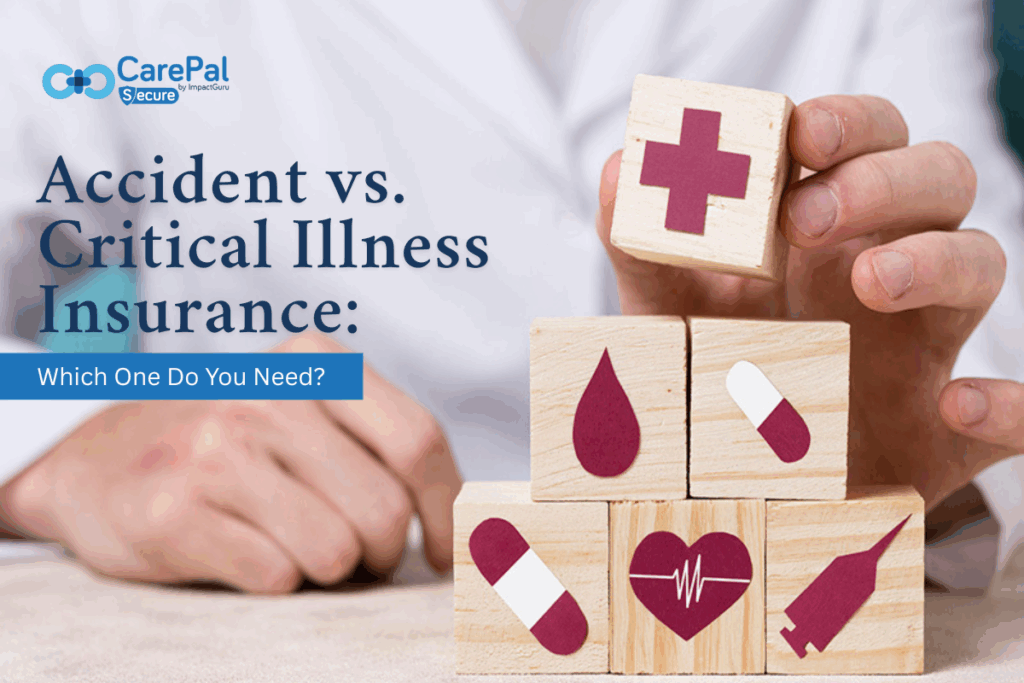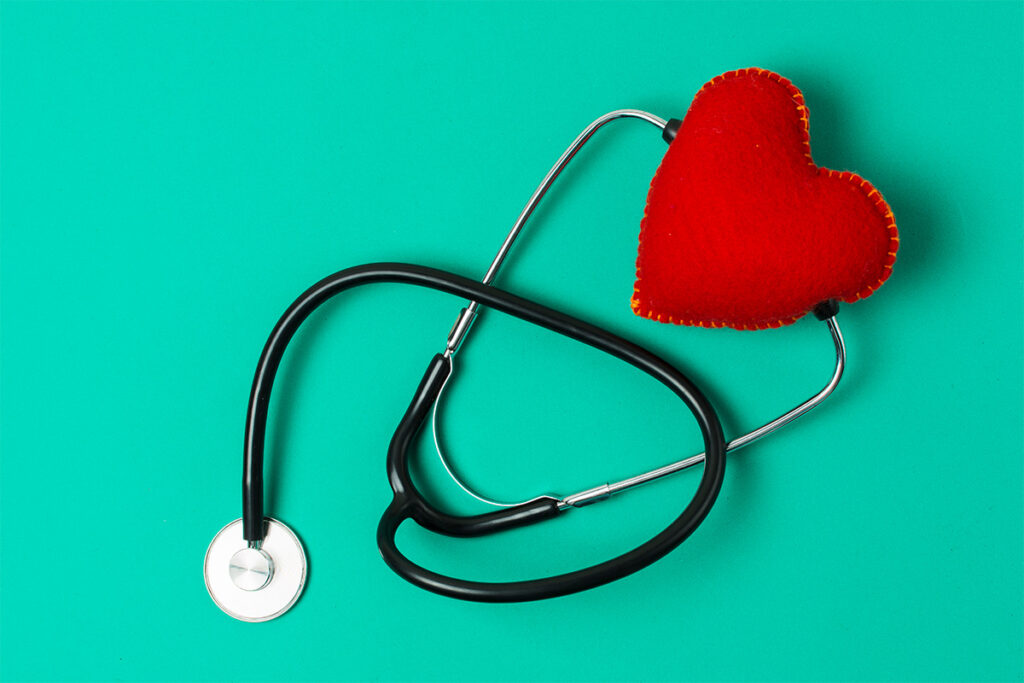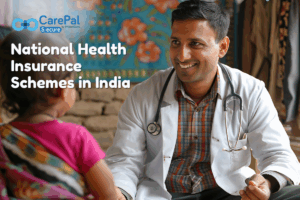Accident vs. Critical Illness Insurance: Which One Do You Need?

Accident vs. Critical Illness Insurance: Which One Do You Need?
Insurance is one of the most vital financial products that allows you to stay covered against uncertainties. Indemnity insurance, personal accident insurance and critical illness insurance are the three main types of health insurance which you should understand in order to build a good protection cover for yourself and your family. This piece broadly summarizes these types so that you can decide which one to buy one and when.
Indemnity Health Insurance
This is the most common type of health insurance in India, so much so that indemnity health insurance has become synonymous with health insurance. Indemnity health insurance covers you against hospital bills and covers medical expenses related to medical treatments in a hospital or operation theater. Generally a comprehensive indemnity health insurance policy will include:
- In-Patient Hospitalization: Coverage for expenses incurred during hospital stays, including room rent, surgeon fees, ICU, etc.
- Pre and post-hospitalization expenses: Disease management at home or any costs incurred before a patient is admitted at a hospital or post-hospitalization.
- Daycare procedures: Deals with treatments that do not require long hospitalization.
- Ambulance fees: Covers transportation in case of high-risk conditions.
- Diagnostic tests: Pays for necessary tests ordered by your doctor.
In addition, the indemnity health insurance policy also covers additional benefits, such as maternity cover, and annual preventive health check-ups. It’s important to read the policy’s terms to know what is included and excluded.
Personal Accident Insurance
Personal accident insurance covers you from unexpected circumstances out of accidents. One key aspect of accident insurance is that it gives you a very big cover for relatively very less premium.
Key features of a typical personal accident insurance include:
- Accidental Death – It pays out a lump sum amount to the nominee in case of the policyholder’s accidental death.Cancer, heart ailments, major organ failure
- Permanent Total Disability: Pays a benefit when the insured is permanently disabled and unable to work.
- Permanent Partial Disability: Recovery for certain disabilities which do not necessarily prevent the insured from working entirely.
- Temporary Total Disability (TTD): Provides weekly benefits for the time when the insured is temporally unable to work because of an accident.
Accidents happen and, given their sudden nature, give very little time to prepare. Accident insurance provides financial stability for individuals or their families in the difficult period after an accident.
Critical Illness Insurance
Critical Illness Insurance pays you a lump sum upon the diagnosis of certain, life-threatening diseases. The importance of critical illness insurance is that unlike indemnity health insurance which covers only for the hospital bills, critical illness insurance helps the patient cover other impact like income disruption (permanent and/or temporary), long-term care etc. which cannot be covered under indemnity health insurance. Some of the most commonly covered illnesses under such plans are cancer, heart ailments, major organ failure, Coma, etc.
Scope of coverage of three types of health insurance:
- Indemnity health insurance: Provides extensive coverage for a wide range of medical costs associated with an array of health conditions, from hospitalizations to surgeries.
- Personal Accident Insurance: Covers injuries or death because of an accident.
- Critical Illness Insurance: Pays a lump sum upon diagnosis of specified critical illnesses.
Benefit structure of three types of health insurance:
- Indemnity health insurance: It reimburses or pays directly the medical bills till the sum insured.
- Personal Accident Insurance: Provides specific benefits according to the type of injury or loss.
- Critical Illness Insurance: Pays a lump sum on diagnosis, regardless of actual medical expenses.
Premium Determinants of various types of health insurance
Indemnity Health Insurance & Critical Illness Insurance: Sum Assured. Age, Gender, Occupation, City of residence, Family History
Personal Accident Insurance: Sum Assured only
How should I choose the right insurance cover for myself and the family?
- Indemnity Health Insurance: A good option for general medical expenses; Most suitable for families looking for extensive health coverage.
- Personal Accident Insurance: Designed for people who take on a higher element of physical risk, such as those doing manual work or with a high frequency of travel.
- Critical Illness Insurance: Good for people who have certain illnesses in the family history or those who want to secure finances against major health complications.
Some insurers also offer combined policies or riders that bundle together these coverages for a more comprehensive approach to protection.
Dealing with the complexities of insurance policies is difficult, but it is very important to realize the differences between indemnity health insurance, personal accident insurance and critical illness insurance because all forms of cover have different roles to play in the aspect of financial planning. The process might involve evaluating personal illness risk factors, occupational factors, and the genetic makeup of family history, then leveraging them into a tailored insurance portfolio that helps mitigate the consequences of future events. Working with insurance professionals and reviewing policy terms can help ensure that the selected coverage is in line with individual requirements and financial objectives.
Frequently Asked Questions
Accidental insurance covers injuries or death caused by accidents. Critical illness insurance covers life-threatening diseases like cancer, heart attack, or stroke.
Some plans include hospitalization coverage, but most offer a lump-sum payout. Always check the policy details for inclusions.
Both serve different purposes. Accident insurance is ideal for unexpected injuries, while critical illness plans help manage high treatment costs for major diseases.
Yes, having both offers broader protection—accident cover for injuries and critical illness cover for major diseases.
Consider your age, lifestyle, medical history, and budget. A combined approach often gives the most comprehensive coverage.

Pankaj Nawani is an accomplished insurance professional with over 20 years of industry experience. His journey has reinforced two key beliefs: that insurance is a powerful force for good and that India needs significantly more of it. Passionate about transforming the sector, Pankaj is on a mission to redefine insurance for India, focusing on innovation across products, sales, and servicing. He collaborates with visionary entrepreneurs, founders, and investors to bring this vision to life.












